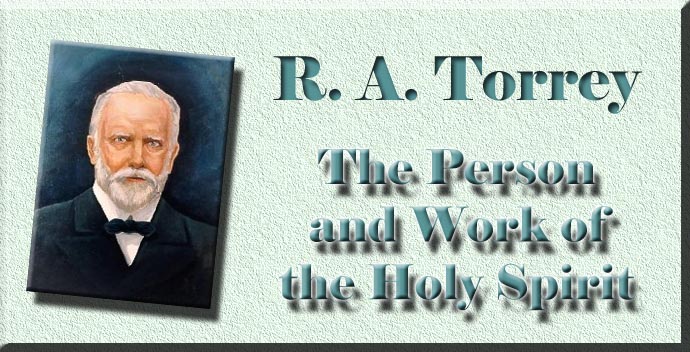The
Holy Spirit Bringing Forth in the Believer Christlike Graces of
Character.
There is a singular charm, a charm that one can scarcely explain, in
the words of Paul in Gal. v. 22, 23, R. V., “The
fruit of the Spirit is love, joy, peace, longsuffering, kindness,
goodness, faithfulness, meekness, temperance.” What
a catalogue we have here of lovely moral characteristics. Paul tells
us that they are the fruit of the Spirit, that is, if the Holy
Spirit is given control of our lives, this is the fruit that He will
bear. All real beauty of character, all real Christlikeness in us,
is the Holy Spirit's work; it is His fruit; He produces it; He bears
it, not we. It is well to notice that these graces are not said to
be the fruits of the Spirit but the fruit, i.
e., if the Spirit is given control of our life, He
will not bear one of these as fruit in one person and another as
fruit in another person, but this will be the one fruit of many
flavours that He produces in each one. There is also a unity of
origin running throughout all the multiplicity of manifestation. It
is a beautiful life that is set forth in these verses. Every word is
worthy of earnest study and profound meditation. Think of these
words one by one; “love”—“joy”—“peace”—“longsuffering”—“kindness”—“goodness”—“faith” (or “faithfulness,” R.
V.; faith is the better translation if properly understood. The word
is deeper than faithfulness. It is a real faith that results in
faithfulness)—“meekness”—“temperance” (or
a life under perfect control by the power of the Holy Spirit). We
have here a perfect picture of the life of Jesus Christ Himself. Is
not this the life that we all long for, the Christlike life? But
this life is not natural to us and is not attainable by us by any
effort of what we are in ourselves. The life that is natural to us
is set forth in the three preceding verses: “Now
the works of the flesh are manifest, which are these, fornication,
uncleanness, lasciviousness, idolatry, sorcery, enmities, strife,
jealousies, wraths, factions, divisions, heresies, envyings,
drunkenness, revellings and such like” (Gal.
v. 21, R. V.). All these works of the flesh will not manifest
themselves in each individual; some will manifest themselves in one,
others in others, but they have one common source, the flesh, and if
we live in the flesh, this is the kind of a life that we will live.
It is the life that is natural to us. But when the indwelling Spirit
is given full control in the one He inhabits, when we are brought to
realize the utter badness of the flesh and give up in hopeless
despair of ever attaining to anything in its power, when, in other
words, we come to the end of ourselves, and just give over the whole
work of making us what we ought to be to the indwelling Holy Spirit,
then and only then, these holy graces of character, which are set
forth in Gal. v. 22, 23, are His fruit in our lives. Do you wish
these graces in your character and life? Do you really wish them?
Then renounce self
utterly and all its strivings after holiness, give up any thought
that you can ever attain to anything really morally beautiful in
your own strength and let the Holy Spirit, who already dwells in you
(if you are a child of God) take full control and bear His own
glorious fruit in your daily life.
We get very much the same thought from a different point of view in
the second chapter and twentieth verse, A. R. V., “I
have been crucified with Christ; and it is no longer I that live,
but Christ liveth in me: and that life which I now live in the flesh
I live in faith, the faith which is in the Son of God, who loved me
and gave Himself up for me.”
We hear a great deal in these days about “Ethical
Culture,” which
usually means the cultivation of the flesh until it bears the fruit
of the Spirit. It cannot be done; no more than thorns can be made to
bear figs and the bramble bush grapes (Luke vi. 44; Matt. xii. 33).
We hear also a great deal about “character
building.” That
may be all very well if you bear constantly in mind that the Holy
Spirit must do the building, and even then it is not so much
building as fruit bearing. (See, however, 2 Pet. i. 5-7.) We hear
also a great deal about
“cultivating graces of character,” but
we must always bear it clearly in mind that the way to cultivate
true graces of character is by submitting ourselves utterly to the
Spirit to do His work and bear His fruit. This is “sanctification of
the Spirit” (1
Pet. i. 2; 2 Thess. ii. 13). There is a sense, however, in which
cultivating graces of character is right: viz., we look at Jesus
Christ to see what He is and what we therefore ought
to be; then we look to the Holy Spirit to make us this that we ought
to be and thus, “reflecting
as a mirror the glory of the Lord, we are transformed into the same
image from glory to glory, even as from the Lord the Spirit” (2
Cor. iii. 18, R. V.). Settle it, however, clearly and forever that
the flesh can never bear this fruit, that you can never attain to
these things by your own effort that they are “the
fruit of the Spirit.” |

 Home
Home What's New
What's New Bible
Bible Photos
Photos Hiking
Hiking E-Books
E-Books Genealogy
Genealogy Profile
Free Plug-ins You May Need
Profile
Free Plug-ins You May Need
 Get
Java
Get
Java.png) Get Flash
Get Flash Get
7-Zip
Get
7-Zip Get Acrobat Reader
Get Acrobat Reader Get
TheWORD
Get
TheWORD
